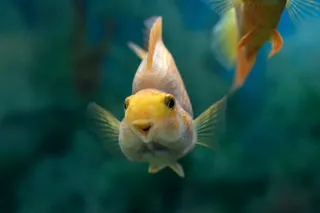From a young age, children learn about the sounds that animals make. But even without teaching aides like Old Macdonald's farm, it turns out that very young babies have an intuitive understanding of the noises that humans, and even monkeys, ought to make. Athena Vouloumanos from New York University found that at just five months of age, infants match human speech to human faces and monkey calls to monkey faces. Amazingly, this wasn't a question of experience - the same infants failed to match quacks to duck faces, even though they had more experience with ducks than monkeys.
Voloumanos worked with a dozen five-month-old infants from English- and French-speaking homes. She found that they spent longer looking at human faces when they were paired with spoken words than with monkey or duck calls. They clearly expect human faces, and not animal ones, to produce speech, even when the words in ...













